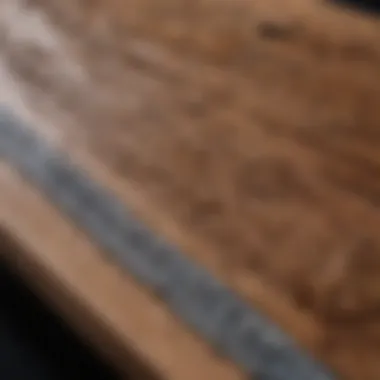Crafting Masterful Watersports Gear: The Intricate Art of Board Shaping Unveiled


Water Activity Overview.
When it comes to watersports equipment, understanding the nuances of water-based activities is vital for crafting the perfect board. Surfing 🌊 requires a specific shape and design to catch the waves effortlessly. Sailing 🌬️ necessitates stability and maneuverability in the watercraft to harness the wind's power. Snorkeling 🐟 demands lightweight yet durable boards for easy navigation. Paddleboarding 🏄 offers a blend of balance and agility, calling for boards designed for smooth gliding on various water surfaces.
Tips and Techniques.
For beginners embarking on their watersports journey, mastering basic board shaping principles is essential. Understanding the intricacies of materials like foam and fiberglass, as well as shaping techniques, lays a solid foundation. Advanced enthusiasts looking to elevate their experience can explore cutting-edge shaping methods and innovation in board construction. Safety guidelines focused on wearing the appropriate gear, understanding water conditions, and board maintenance are crucial for all levels of expertise.
Gear Reviews.
Delving into the world of watersports equipment, detailed reviews of surfboards 🏄, sailboats ⛵, snorkeling gear 🤿, paddleboards 🏄, and wetsuits 🩱 are indispensable for informed decisions. Surfboards varying in shape and volume cater to different skill levels and wave conditions. Sailboats offer diverse features like keels and rigs, tailored for specific sailing experiences. Snorkeling equipment consisting of masks, fins, and snorkels should prioritize comfort and functionality. Paddleboards come in various designs for performance and stability across calm or choppy waters. Wetsuits designed with neoprene provide insulation and flexibility for prolonged water activities.
Destination Guides.
The allure of traveling to popular and hidden gems of watersports locations 🗺️ adds a thrill to enthusiasts' experiences. Exploring destinations like Hawaii, Bali, Maldives, and California unveils diverse water activities against stunning backdrops. Hidden gems off the beaten path offer tranquility and unspoiled beauty for a unique adventure. Travel tips encompassing accommodation options, local insights, and off-season advantages enrich watersports trips with memorable experiences.
Introduction
Board shaping is an art form that combines craftsmanship and ingenuity to create high-performance watersports equipment. This section introduces readers to the intricate process of shaping boards, highlighting the meticulous steps involved in crafting the perfect gear for water enthusiasts. From material selection to precision shaping techniques, every aspect plays a vital role in the final product's quality and performance. Exploring the evolution of board shaping unveils the historical and technological advancements that have shaped the current landscape of watersports equipment production.
The Evolution of Board Shaping
Historical Perspectives
Embarking on a journey through historical perspectives allows us to understand the roots of board shaping and its transformation over time. Historical board shaping techniques laid the foundation for modern practices, showcasing the artistry and skills passed down through generations. By delving into the origins of board shaping, we gain valuable insights into the traditional methods that have stood the test of time. While these techniques may seem rudimentary compared to today's advancements, their simplicity and effectiveness continue to influence contemporary board shaping processes.
Technological Advancements


In contrast, technological advancements represent a paradigm shift in board shaping, revolutionizing the industry's landscape. The integration of cutting-edge technologies such as Computer-Aided Design (CAD) has streamlined the manufacturing process, enhancing precision and efficiency. These advancements enable manufacturers to explore innovative designs and tailor boards to meet specific performance requirements. While the benefits of technological advancements are undeniable, challenges such as excessive reliance on automation can compromise the artisanal elements of board shaping. Striking a balance between tradition and innovation remains a crucial consideration in harnessing the full potential of technological advancements in crafting watersports equipment.
Materials Selection
Materials selection is a critical aspect of crafting the perfect watersports equipment. The choice of materials profoundly impacts the performance, durability, and overall quality of the board. When selecting materials, factors such as strength, weight, flexibility, and cost must be carefully considered to ensure optimal performance. Additionally, the environmental impact of the materials used plays a significant role in sustainability and eco-friendliness, which are increasingly important considerations in today's watersports industry.
Choosing the Right Materials
Impact of Materials on Performance
In the realm of board shaping, the impact of materials on performance cannot be overstated. The materials chosen directly influence the board's speed, stability, maneuverability, and durability. For instance, materials like carbon fiber are known for their light weight and high strength, enhancing the board's performance in terms of speed and agility. On the other hand, fiberglass provides a good balance between strength and flexibility, contributing to maneuverability and responsiveness. The careful selection of materials based on specific performance criteria is key to achieving the desired characteristics in the final product.
Sustainability Considerations
In today's environmentally conscious world, sustainability considerations have become paramount in materials selection. Opting for eco-friendly materials such as recycled plastics, bamboo, or hemp not only reduces the carbon footprint of board production but also aligns with the growing demand for sustainable practices in watersports. These materials offer durability and performance while minimizing environmental impact, making them an ideal choice for environmentally conscious board shapers and users alike.
Exploring Alternative Materials
Innovative Options
Exploring innovative materials opens up a world of possibilities for board shapers. Materials like bio-resins, algae-based composites, or mushroom-based foam are revolutionizing the industry with their unique properties and sustainable attributes. Bio-resins, for instance, offer a non-toxic alternative to traditional resins, reducing harmful emissions during production. These innovative materials not only contribute to advanced board performance but also showcase a commitment to environmentally friendly practices, setting a new standard in board shaping.
Environmental Benefits
Considering the environmental impact of materials is vital in board shaping. Opting for materials with inherent environmental benefits, such as natural fibers or upcycled materials, supports a circular economy model and reduces waste in the manufacturing process. By integrating materials that offer environmental advantages, board shapers can create high-performance boards that reflect a commitment to sustainability. The environmental benefits of alternative materials go hand in hand with performance, offering a holistic approach to crafting the perfect watersports equipment.
Shaping Technique


Shaping techniques play a pivotal role in the creation of high-quality watersports equipment. By mastering the art of shaping, manufacturers can optimize performance and ensure durability in their boards. The meticulous process of shaping involves both traditional and modern methods, each offering unique benefits to the final product. Hand-Shaping has been a longstanding technique favored for its precision and individualized touch. Craftsmen meticulously carve and sculpt the board by hand, allowing for personalized adjustments tailored to the rider's preferences. Hand-Shaping provides a level of artistry and craftsmanship that resonates with enthusiasts seeking a bespoke touch in their equipment. However, it can be labor-intensive and time-consuming, requiring skilled artisans to achieve the desired results. Computer-Aided Design (CAD), on the other hand, introduces a technological edge to board shaping. CAD enables precise design iterations, efficient prototyping, and enhanced consistency in mass production. This method streamlines the manufacturing process, reducing human error and ensuring geometric accuracy. While CAD offers efficiency and scalability, some enthusiasts may argue that it lacks the organic feel and authenticity of hand-crafted boards. Each method brings its own set of advantages and considerations, contributing to the rich tapestry of board shaping techniques.## ditional vs. Modern Shaping Methods## Ha haping is a cornerstone of traditional board shaping, embodying the essence of artisan craftsmanship. Craftsmen meticulously sculpt the board by hand, epitomizing a hands-on approach to shaping that resonates with purists and connoisseurs. The tactile nature of hand-shaping allows for subtle nuances and customizations that cater to individual preferences. However, hand-shaping can be time-consuming and labor-intensive, requiring experienced artisans to master this intricate craft. On the other end of the spectrum, Computer-Aided Design (CAD) revolutionizes modern board shaping with precision and efficiency. CAD software enables designers to create intricate board designs, simulate performance scenarios, and optimize structural integrity. This digital tool enhances production scalability and geometric accuracy, streamlining the manufacturing process. Despite its advantages, CAD can lack the organic touch and artistic flair associated with hand-shaped boards. Finding the balance between tradition and innovation is key to harnessing the best of both worlds in board shaping practices.
Craftsmanship and Precision
Craftsmanship and Precision play a vital role in the process of board shaping. It is the meticulous attention to detail and skillful execution that differentiate a mediocre board from a high-quality, high-performance piece of watersports equipment. Craftsmanship encompasses the artistry and expertise required to create boards that not only look visually appealing but also deliver top-tier performance in the water. Precision, on the other hand, ensures that every measurement, carve, and contour is accurately executed to achieve the desired outcome. Without impeccable Craftsmanship and Precision, the final product may fall short of meeting the stringent standards of watersports enthusiasts.
Attention to Detail
Fine-Tuning Performance
Fine-Tuning Performance is a critical aspect of board shaping that focuses on optimizing the board's functionality and responsiveness in varying water conditions. By meticulously refining the design, materials, and shape of the board, manufacturers can tailor its performance characteristics to meet the specific needs of different riders. Fine-Tuning Performance allows for subtle adjustments that can enhance speed, maneuverability, stability, and overall control, providing riders with a more customized and enjoyable experience on the water. While Fine-Tuning Performance offers significant advantages in terms of performance enhancement, it also requires extensive testing and refinement to strike the perfect balance between different performance attributes.
Ensuring Durability
Ensuring Durability is a key consideration in board shaping that addresses the longevity and reliability of the final product. Boards designed with durability in mind are built to withstand the rigors of watersports activities, including impact, pressure, and exposure to various environmental elements. Manufacturers employ innovative construction techniques and materials to enhance the board's strength, resilience, and longevity without compromising its performance. By Ensuring Durability, board shapers guarantee that their creations can endure frequent use and challenging conditions, providing riders with a long-lasting investment in their watersports equipment.
Quality Control
Testing Protocols
Testing Protocols are essential in ensuring that each board meets the stringent quality standards set by manufacturers. Through rigorous testing procedures, including performance assessments, stress tests, and quality checks, board shapers can identify any potential weaknesses or imperfections in the final product. Testing Protocols not only verify the structural integrity and performance capabilities of the board but also help manufacturers identify areas for improvement in future iterations. By adhering to robust testing protocols, board shapers can instill confidence in riders regarding the quality and reliability of their watersports equipment.
Quality Assurance Measures
Quality Assurance Measures are systematic processes implemented throughout the board shaping journey to maintain consistency in quality and performance. These measures encompass quality checks at various stages of production, adherence to industry standards, and continuous monitoring of materials and techniques. By implementing rigorous quality assurance measures, manufacturers can minimize defects, ensure uniformity across product lines, and enhance customer satisfaction. Quality Assurance Measures are integral to upholding the reputation of board shapers as creators of premium watersports equipment that excels in both performance and durability.
Innovations in Board Shaping


In the realm of watersports equipment, the section on Innovations in Board Shaping stands out as a beacon of progress and excellence. This segment delves into the cutting-edge advancements revolutionizing how boards are crafted, elevating performance, durability, and overall user experience. By focusing on pushing the boundaries of traditional shaping techniques, this section aims to highlight the game-changing elements that propel watersports equipment into the future
Emerging Trends
Smart Materials Integration
A pivotal aspect within the domain of board shaping is the integration of Smart Materials. These materials, known for their adaptive characteristics and responsive nature, play a vital role in enhancing board performance and functionality. Smart Materials are engineered to react to varying conditions, molding the board's properties to optimize performance. Their ability to adjust to different stimuli, such as water temperature or user input, ensures a dynamic and responsive riding experience. Their lightweight nature is advantageous, contributing to improved maneuverability and speed on the water. However, one must consider the potential challenges posed by Smart Materials, such as cost implications and maintenance requirements. Despite these considerations, the benefits they offer in terms of fine-tuning board performance make them a popular choice for crafting high-quality watersports equipment.
Hybrid Construction Methods
Another groundbreaking innovation making waves in the board shaping industry is the adoption of Hybrid Construction Methods. This approach combines the strengths of different materials to create boards that excel in diverse conditions and riding styles. By merging materials with complementary properties, hybrid construction enhances board durability, responsiveness, and versatility. The key characteristic of Hybrid Construction Methods lies in its ability to tailor the board's characteristics to meet specific performance requirements. This versatility allows riders to enjoy a personalized experience suited to their preferences and riding environment. While the advantages of hybrid construction methods are significant, there are considerations to bear in mind, such as the challenge of balancing material integration for optimal performance. Despite this, the unique features of hybrid construction methods make them a valuable choice for enhancing board quality and elevating the watersports experience.
Future Prospects
In the realm of board shaping for watersports equipment, the contemplation of future prospects holds paramount significance. It serves as a guiding beacon, illuminating the path towards innovation and advancement in the industry. Anticipation of the unfolding technological marvels and sustainable practices become intrinsic components of this visionary outlook. Future prospects pave the way for evolution, ensuring that the craft of board shaping continues to push boundaries and defy expectations. As enthusiasts and professionals alike embrace the waves of change, the potential for groundbreaking developments in design, materials, and construction techniques becomes tantalizingly palpable.
Technological Advancements
Predictive Modeling
Delving into the intricate tapestry of board shaping, Predictive Modeling emerges as a linchpin in the realm of technological advancements. This cutting-edge approach harnesses the power of data and simulation to forecast performance outcomes with unparalleled accuracy. By leveraging mathematical algorithms and computational simulations, Predictive Modeling offers a glimpse into the future behavior of watersports equipment, enabling craftsmen to refine shapes, materials, and structural integrity. Its predictive prowess empowers designers to make informed decisions, optimizing performance metrics and fine-tuning board characteristics to meet the exacting demands of athletes and enthusiasts. While not devoid of challenges, such as model validation and computational complexities, Predictive Modeling stands as an indispensable tool in the arsenal of board shapers, driving innovation and precision to new heights.
Industry Innovations
Amidst the ever-evolving landscape of board shaping, Industry Innovations emerge as catalysts for transformative progress and creative ingenuity. These groundbreaking advancements encompass a spectrum of cutting-edge technologies, materials, and methodologies that redefine the boundaries of what is possible in the world of watersports equipment. From novel manufacturing processes to revolutionary design concepts, Industry Innovations epitomize the relentless pursuit of excellence and efficiency in board crafting. By embracing the latest trends and breakthroughs, artisans and manufacturers can stay ahead of the curve, delivering products that not only meet but exceed the expectations of discerning consumers. While navigating the terrain of Industry Innovations presents its share of challenges, the rewards in terms of enhanced performance, durability, and aesthetic appeal make the journey undeniably worthwhile.
Sustainable Practices
In a landscape increasingly shaped by environmental consciousness and ethical considerations, Sustainable Practices emerge as pillars of responsible board shaping. Within this paradigm, Circular Economy Initiatives stand out as beacons of sustainability, advocating for a holistic approach to material sourcing, production, and end-of-life management. By prioritizing circularity and resource efficiency, Circular Economy Initiatives aim to minimize waste, reduce environmental impact, and promote a regenerative approach to manufacturing. The integration of circular principles not only benefits the ecosystem but also resonates with consumers who prioritize ethical and eco-conscious purchasing decisions. While implementing Circular Economy Initiatives may entail initial challenges such as supply chain optimization and material repurposing, the long-term benefits in terms of resource conservation and environmental stewardship make it a compelling choice for board shapers committed to creating a greener future.
Eco-Friendly Solutions
As the clarion call for sustainability reverberates across industries, Eco-Friendly Solutions emerge as indispensable tools in the arsenal of conscientious board shapers. These eco-conscious alternatives embody a commitment to reducing ecological footprint and embracing renewable resources in board manufacturing. By incorporating bio-based materials, recyclable components, and energy-efficient processes, Eco-Friendly Solutions offer a pathway to greener, more sustainable board shaping practices. The allure of eco-friendliness resonates not only with environmentally conscious consumers but also with regulatory bodies and industry watchdogs advocating for greener manufacturing standards. Despite facing challenges such as cost implications and scalability issues, the adoption of Eco-Friendly Solutions represents a pivotal step towards harmonizing board shaping with ecological well-being, steering the industry towards a more sustainable and environmentally conscious future.















